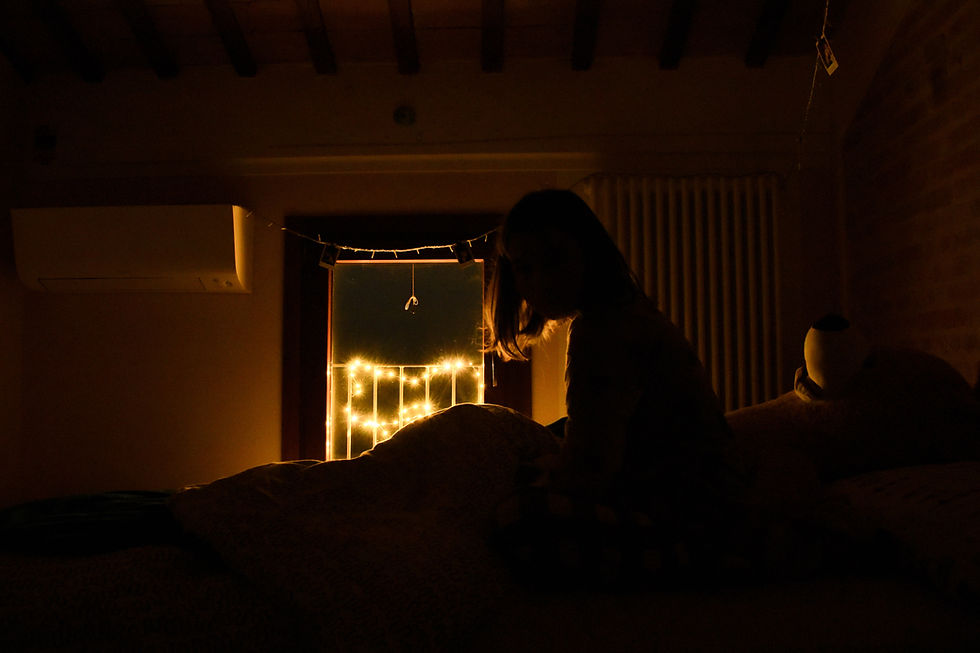Sleep Well, Feel Well: The Importance of Circadian Rhythms for Mental Health
- Coastal Breeze Mental Health

- Mar 27, 2023
- 2 min read
Circadian rhythms, also known as our internal biological clock, are essential for regulating our sleep-wake cycle, hormone production, and other physiological processes. Disruptions to our circadian rhythms can have a significant impact on our mental health and overall well-being. In this post, we'll explore the importance of circadian rhythms for good sleep and mental health.
What are circadian rhythms?
Circadian rhythms are the natural, 24-hour cycles that regulate our body's physiological processes, including sleep-wake cycles, body temperature, and hormone production. These rhythms are primarily controlled by a small region in the brain called the suprachiasmatic nucleus (SCN), which receives signals from our eyes to help synchronize our internal clock with the external environment.
Why are circadian rhythms important for good sleep?
Our bodies rely on our circadian rhythms to regulate our sleep-wake cycle. When our internal clock is synchronized with our environment, we are more likely to feel alert and awake during the day and sleepy at night. Disruptions to our circadian rhythms, such as traveling across time zones or working night shifts, can throw off our sleep-wake cycle and lead to sleep problems, such as insomnia or daytime sleepiness.
How do circadian rhythms affect mental health?
Circadian rhythms play a critical role in regulating our mood, cognition, and emotional well-being. Sleep problems are common among individuals with mental health disorders, such as depression, anxiety, and bipolar disorder. In some cases, sleep problems may be a symptom of the underlying mental health condition, while in others, disruptions to circadian rhythms may contribute to the development or exacerbation of mental health symptoms.
For example, studies have found that individuals with depression often have disrupted circadian rhythms, including irregular sleep-wake cycles and altered hormone production. Disruptions to circadian rhythms have also been linked to an increased risk of developing mood disorders, such as bipolar disorder. Additionally, sleep problems have been linked to an increased risk of developing anxiety disorders.
How can we improve our circadian rhythms and promote good sleep?
There are several strategies we can use to improve our circadian rhythms and promote good sleep:
Stick to a consistent sleep schedule: Going to bed and waking up at the same time each day can help regulate our internal clock and promote better sleep.
Limit exposure to bright light at night: Exposure to bright light, such as from electronic devices, can suppress the production of melatonin, a hormone that helps regulate our sleep-wake cycle. Try to limit exposure to bright light for at least an hour before bed.
Create a sleep-conducive environment: Make sure your bedroom is quiet, cool, and dark, and free from distractions, such as electronic devices.
Get regular exercise: Exercise can help regulate our circadian rhythms and promote better sleep. Try to get at least 30 minutes of moderate exercise each day, but avoid vigorous exercise close to bedtime.
Limit caffeine and alcohol intake: Both caffeine and alcohol can disrupt our sleep-wake cycle and contribute to sleep problems.
In summary, circadian rhythms play a critical role in regulating our sleep-wake cycle and promoting good mental health. Disruptions to our circadian rhythms can lead to sleep problems and contribute to the development or exacerbation of mental health symptoms. By adopting healthy sleep habits, we can improve our circadian rhythms and promote better sleep and mental well-being.



